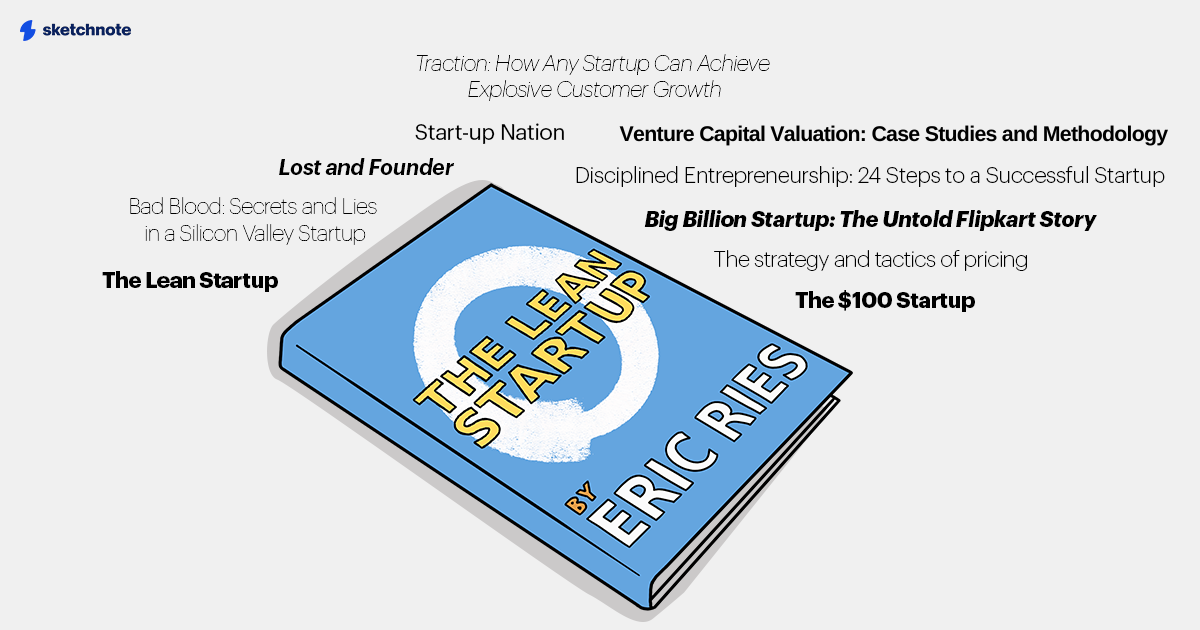Recently, the content team at Sketchnote sat down to chat with Sketchnote's co-founder and CEO, Shreekant Pawar, over coffee at his house and office. Shreek's house has at least two walls (to the best of our memory) dedicated to bookshelves full of books about startups, fitness, and even fiction.
We got curious and asked him about how he made time to read despite his extremely busy schedule, and how one could cultivate this healthy habit the same way. He somberly told us that initially, we'd have to force ourselves to read until picking up a book at a set time in the day became second nature to us. He added that reading is a great way to unwind, while simultaneously learning something new. Shreek also warned against getting into any sort of ego-boosting contest over the number of books we read. “It's more important to APPLY what we learn, as opposed to reading more and more.”
Surprisingly enough, these sage words work really well for anyone in the world of startups. Especially if you wish to gain a wealth of experience within hours.

Looking for the best startup books? Here's some food for thought
If you're about to launch a startup of your own sooner or later, look away now. Because the figures for startup success are usually bleak. They say 9 out of 10 startups likely fail due to various reasons. And when you're about to be a founder, you need to be like a sponge to soak in all the world's knowledge—quickly—in order to help improve the odds against you. One of the greatest ways to do it is to learn from other successful and not-so-successful entrepreneurs.
However, it's impossible to go through the same experiences every single founder before you have gone through. The next best thing is to read about their experiences and learn from the mistakes they made. Or listen to their advice.

Add these 10 books to your list if you are a startup enthusiast. This curation works best for both new and seasoned entrepreneurs!
Here's a list of books that anyone who is thinking of starting up or is already a founder or even a serial entrepreneur will benefit from reading.
The Lean Startup by Eric Reis
The birth of a lean startup as a concept came from observing the Toyota manufacturing revolution, which transformed the car manufacturer into a flourishing global company. Leaning on the individual employee's creativity, smaller batch sizes, using scientific production and inventory control techniques, and accelerated cycle times propelled Toyota to manufacturing success.
With these key principles in mind, author Eric Reis commenced an inquiry on practical ways to cut the "fat" in a startup organization. Hastening to validate your MVP, steering clear of any vanity matrices with useful reports, and staying iterative and agile with the 5 Whys inquiry are some of the insights he's highlighted that can help run an effective company.
This book is for you if you are looking for pragmatic ways to run a lean startup!
The $100 Startup by Chris Guillebeau
If you want to convert your passion projects into a sustainable business, The 100$ Startup is the book for you! The author Chris Guillebeau wrote this guide after studying 1,500 entrepreneurs who've made $50,000 or more, by monetizing their passions.
Guillebeau doesn't shy away from laying down the hard facts upfront—that passion is only one-third of the equation of creating a successful business. The other critical components to creating any enterprise are skills and customers.
This book provides are a realistic way to build on your passion and goads you to action!
The Strategy and Tactics of Pricing by Thomas Nagle and Georg Muller
Revenue is the lifeblood of your startup, and the pricing decision is a critical aspect of your top line! Therefore, our next pick is The Strategy and Tactics of Pricing.
The authors begin by shunning dogmatic price-setting methods like cost plus method, customer-based pricing, and shared-driven pricing. The book then goes on to state that determining your product's worth is just step one to correct pricing.
This is followed by a detailed strategic pricing strategy covering effective customer segmentation, bundling, and unbundling (when needed). Factoring in consumer psychology, and competition in product pricing makes this book a complete masterclass!
Bad Blood: Secrets and Lies in a Silicon Valley Startup by John Carreyrou
Our next pick is probably a lesson in what NOT to do while building a startup. Bad Blood chronicles how Elizabeth Holmes, a Stanford dropout, sold her vision of a "magic box" that offered end-to-end medical solutions, to her investors, and the media alike.
The $9 billion valuation of Theranos, Holmes' company, made her an overnight sensation and the first self-made billionaire. The company even attracted many American political personalities, like Henry Kissinger, to its board.
The problem? The technology that Theranos was based on was a complete sham that was outed in a well-researched article in the Wall Street Journal. What followed was many, many court cases, some of which are still pending before the courts.
Add this book to your list for an account of a major corporate scandal rooted in charismatic storytelling!
Lost and Founder by Randy Fishkin
Fishkin is the founder of Moz and Lost and Founder is a brutal account of a founder's life. The book details the challenges and obstacles that entrepreneurs often face, along with practical advice.
Detailing topics such as fundraising, growth, and leadership, Fishkin offers tips on how to overcome common challenges and succeed as an entrepreneur. The book champions the values of persistence and resilience, and always staying true to your vision. This is the hard-hitting startup primer that founders will really benefit from.
Start-up Nation by Dan Senor and Saul Singer
Most of the books on this list are individualistic in nature, that is, related to the founder mentality and hustle. The start-up Nation provides a window into how macro factors have led Isreal to be a major start-up hub for the world.
The authors point out that Israel has one startup for every fourteen hundred people in the country. In the book, Senor and Singer focus on five key aspects that have propelled Israel's start-up ecosystem. The five aspects are largely contrasting with each other, which combined together, sets Israel apart. For example, while mandatory military service has added a disciplined and structured character to its Israeli youth, the author says that a more informal atmosphere at work is encouraged to bring out the best in people. The juxtaposition of these two opposing traits makes Israelis unique.
This book also encourages start-ups to play to their strengths in the face of immutable difficulties, by putting a premium on failed attempts.
Disciplined Entrepreneurship by Bill Aulet
If you are one to see value in having well-defined roadmaps to reach your goals, Disciplined Entrepreneurship is for you. This book provides a 24-point framework that any aspiring entrepreneur can apply to their projects.
Often, the starting point of any business venture is the business idea. Aulet advises going against the grain by first commencing a business venture with the process of defining the end users or customers. What follows in further steps is the further refining of your customer profile, culminating in the development of a product plan for these customers.
This customer focus can steer businesses away from many pitfalls, and therefore is a part of our list!
Traction: How Any Startup Can Achieve Explosive Customer Growth by Gabriel Weinberg
In the same vein as our previous selection, Traction advises founders to split their time and resources equally between product and traction development.
This book offers 19 key traction channels to get more customers and achieve exponential growth. Each of these channels is detailed in separate chapters in the book, along with useful background information and practical examples. Traction simplifies complex marketing methods and makes them accessible to founders looking to grow their customer base.
Big Billion Startup: The Untold Flipkart Story by Mihir Dalal
Dalal chronicles the great Indian entrepreneurial dream of Sachin and Binny Bansal in this bestselling book. Started in an apartment in Koramangala, Bengaluru with Rs 4,00,000 (approx $5k), the Bansals' home-grown Indian E-commerce website was ultimately brought out by Walmart for $16 billion. Flipkart's massive growth story reads like any other startup journey, where the struggles expand in arithmetic proportions, as does the company. If you are a founder looking for solidarity in your daily startup scuffles, this is the book for you. It even comes with a bright light at the end of the tunnel!
Venture Capital Valuation: Case Studies and Methodology by Lorenzo Carver
Any talk of startups is incomplete without VC and startup valuation. Venture Capital Valuation demystifies valuation by providing overviews of the methods and techniques used to value companies in the venture capital industry.
This VC primer for startups talks about narrowing down a startup's business model and identifying its growth potential. It also talks about aligning the interests of the startup with the VC. This book is a valuable resource for all stakeholders of venture capital.
Remember the conversation we were having at Shreek's home, about reading? He had one last nugget to add about how reading can help us avoid mistakes that these authors have made and written about. “It's the easiest way to look beyond yourself and what you know!" Amen, and now it's your turn to make the best of your reading journey!



